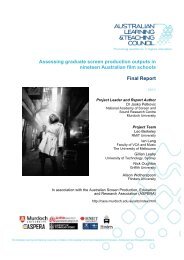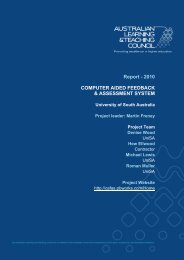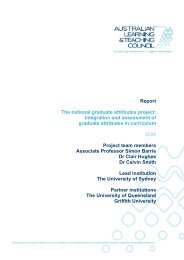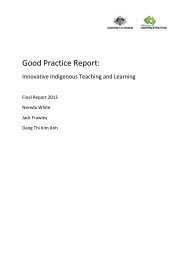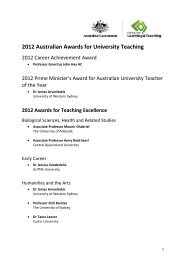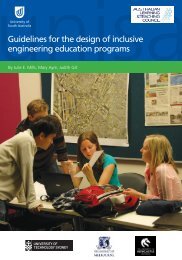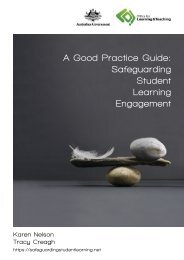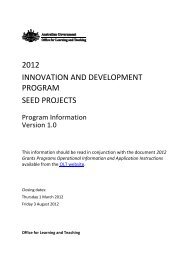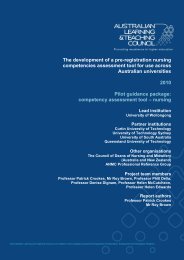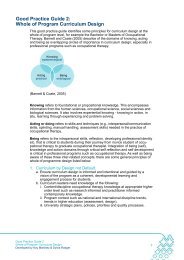have good examples <strong>and</strong> be easy to read. For example, one of them said, “Clear<strong>and</strong> precise headings with worked examples <strong>and</strong> working <strong>for</strong> answers (when doingmath) also secondary sources in a textbook to back-up what is being said”.Similar to international students, some of the local students do not regularly askquestions in class. They prefer other ways, such as sending emails. However, theysupport the idea that students should be given more opportunities to ask questions.All the local <strong>and</strong> international students think that students should actively engage inthe classroom discussions in their learning.Most of the local <strong>and</strong> international students are willing to choose their own groupmembers <strong>for</strong> group assignments. Local students think that some group membersrelying on others <strong>and</strong> not trying their best is the main problem of group assignments.For example, one of them said, “In some group assignments I have found that somestudents are content with gaining mediocre marks, just to skim through. This can bequite distressing <strong>for</strong> members of the group who are highly ambitious <strong>and</strong> want togain the best possible mark. ‘Social loafing’ can also occur where students when putinto a group situation allow others to contribute more work”.As to presentation, some of the local students also have the same problem asinternational students in that they are very shy of doing presentation. For example,one local student said, “I am a shy person. I am not com<strong>for</strong>table with st<strong>and</strong>ing infront of people <strong>and</strong> talking, which means I also go badly in them usually”.Unlike international students, most local students do not mind doing groupassignments with international students, even if they have language problems, <strong>and</strong>think it is a good way <strong>for</strong> local students to experience different cultures. Forexample, one local student said, “I would like to do a group assignment withinternational students as it will help you in the way that you can get to see anotherculture <strong>and</strong> they may be very helpful in the group as they may have the in<strong>for</strong>mationthat the group needs or they may have an idea that will help the group to answer thequestion that your group has been set”.A majority of local <strong>and</strong> international students prefer not to spend most of their timeon campus. For example, one local student said, “No I don’t, I only go theresometimes if I need to use a textbook or use their net to download some things Ineed because mine is extremely slow”.6.2 Comparison of perspectives between international students <strong>and</strong> lecturers onteaching <strong>and</strong> learningThe interview questions are composed of five main sections, the textbook <strong>and</strong>reference materials, teaching <strong>and</strong> learning methods, assessment, educationmanagement systems <strong>and</strong> language issues in general. Despite some significantdifferences between students <strong>and</strong> lecturers regarding various issues in these fivecategories, both students <strong>and</strong> lecturers agree that the biggest difficulty in this crossculturallearning <strong>and</strong> teaching environment is the language <strong>and</strong> cultural barrier. Thissection will compare the perspectives between international students <strong>and</strong> lecturersfrom the following five aspects.6.2.1 <strong>Teaching</strong> content <strong>and</strong> textbooks1. Regarding the readingMost lecturers set specific readings <strong>for</strong> students <strong>and</strong> expect their students to readthem <strong>and</strong> improve underst<strong>and</strong>ing; however, the majority of international studentshave problems reading textbooks due to the language difficulties. Limitedvocabulary in the discipline area makes the reading very time-consuming <strong>and</strong>stressful. Thus, students are not able to meet the expectations of lecturers. Studentsthere<strong>for</strong>e want to read the most important parts of the textbooks <strong>and</strong> prefer to only119
ead lecture notes.2. Regarding the choice of textbookMost lecturers think good textbook should have broad coverage, be contemporary,<strong>and</strong> have a combination of theory <strong>and</strong> practice. The students would like a textbookwith sufficient case studies <strong>and</strong> examples that has simple language <strong>and</strong> is wellstructured.Interestingly, the interviews with local students reveal that even localstudents feel their current textbooks use too much jargon, do not give simpleanswers <strong>and</strong> go into unnecessary depth. Most students think the textbook content istoo long <strong>and</strong> prices are too high.3. Lecture notesMost lecturers think the students rely too much on PowerPoint slides. However, dueto the difficulty of reading the textbook, students choose to rely heavily on simplifiedstudy material such as lecture notes to enhance their underst<strong>and</strong>ing of the subject.6.2.2 <strong>Teaching</strong> <strong>and</strong> <strong>Learning</strong> MethodsThere is some consistency in students’ <strong>and</strong> lecturers’ perspective of teachingmethod. Most lecturers adopt, or attempt to adopt, class activity in their teaching <strong>and</strong>make an ef<strong>for</strong>t to encourage students to talk, <strong>and</strong> most students prefer to have moreinteraction in class, such as class discussion. However, almost all students wouldlike to be in a small group teaching environment so that they feel more confident <strong>and</strong>com<strong>for</strong>table in speaking. Most international students prefer <strong>and</strong> expect individualattention from the lecturer. However, some students prefer the lecturer to talk all theway through, giving good examples <strong>and</strong> explanation, as they think this is a moreefficient way <strong>for</strong> them to learn. More international students prefer more face-to-faceteaching, less students questions <strong>and</strong> class discussions. They prefer to have moreknowledge to be trans<strong>for</strong>ed from lectures to students.6.2.3 Assessment1. Group assignmentMost of the students view the group assignment positively, despite the fact that theyall experience difficulty working with each other. They think it is important <strong>for</strong> them todevelop teamwork skills. Most prefer to find their own group, which they feel willwork better. However, the lecturers have quite a mixed attitude towards groupassignments. Some think the group work idea is good; however, the apparentproblem is the “free ride”. Thus, lecturers are very cautious with group work. When itcomes to group <strong>for</strong>mation, most lecturers ask students to <strong>for</strong>m their own groups.Some lecturers tend to make an ef<strong>for</strong>t to mix international students with local,however very few students prefer this.2. PresentationLecturers think the presentation is an important tool <strong>for</strong> developing students’communication skills; however international students lack confidence inpresentation, especially when it is a part of their assessment. While a little over halfof the students like presentation, the other half does not. The international studentsfeel they are disadvantaged in language, thus they feel nervous <strong>and</strong> shy whichapparently impacts negatively on their per<strong>for</strong>mance.6.2.4 Education Management systemLectures feel that students should have more knowledge regarding universityeducation management systems, especially about university policies such as thepolicy on plagiarism. Most students are satisfied with the credit point systemadopted in Australia. However many of them have difficulties when it comes toselecting subjects. Even though the International <strong>Office</strong> of each university provides120
- Page 1 and 2:
Strategies and Approaches toTeachin
- Page 3 and 4:
Table of Contents0 EXECUTIVE SUMMAR
- Page 5:
0 Executive SummaryAustralian terti
- Page 8 and 9:
1 Project OutcomesThe outcomes of t
- Page 10 and 11:
The identification information sect
- Page 12:
questions aim to discover their ass
- Page 15 and 16:
3.2 Literature reviewCross-cultural
- Page 17 and 18:
4 Survey Data AnalysisThis section
- Page 19 and 20:
Total Count 380 632 1012Percentage
- Page 21 and 22:
2 Count 12 30 42Percentage 3.1% 4.7
- Page 23 and 24:
Table 13 shows that nearly all loca
- Page 25 and 26:
methods are good, while less than h
- Page 27 and 28:
Preferredfewerlectures andmore labs
- Page 29 and 30:
Table 26 (Question III.4.D) Preferr
- Page 31 and 32:
Maindifferencesbetweenteachingmetho
- Page 33 and 34:
Table 33 shows that about half of l
- Page 35 and 36:
Table 38 (Question IV.4) Sufficient
- Page 37 and 38:
understanding lectures?Table 42 (Qu
- Page 39 and 40:
confident Count 301 179 480Percenta
- Page 41 and 42:
Table 49 (Question VI.4) Caring abo
- Page 43 and 44:
Table 52 shows that more local stud
- Page 45 and 46:
Table 56 shows that both local and
- Page 47 and 48:
a chi-square test to determine whet
- Page 49 and 50:
Significance Level (α= 0.05)Hypoth
- Page 51 and 52:
presentations are unrelated (Indepe
- Page 53 and 54:
Hypotheses V.2H0: Student category
- Page 55 and 56:
encountered at university in 2/3/4
- Page 57 and 58:
III.7What are you most concerned ab
- Page 59 and 60:
II.6.EII.6.FII.6.GTextbooks you pre
- Page 61 and 62:
VII. OtherVII.1.1VII.1.2What are th
- Page 63 and 64:
III.6 Do you like lecturers to ask
- Page 65 and 66:
distribution of these comments acro
- Page 67 and 68:
Figure 4.5 University of Sydney und
- Page 69 and 70: Australia is the environment (11.06
- Page 71 and 72: example, one student said that home
- Page 73 and 74: 5 Interview Data AnalysisThis secti
- Page 75 and 76: class?Eight students thought studen
- Page 77 and 78: (1) Did you have any difficulty sel
- Page 79 and 80: 5.2 Staff interview data analysisA
- Page 81 and 82: (2) Do you think that the methods y
- Page 83 and 84: is the biggest problem”. One lect
- Page 85 and 86: comments was, “No, I send them to
- Page 87 and 88: lecturer, and one of them like the
- Page 89 and 90: am a shy person I am not comfortabl
- Page 91 and 92: When they have difficulties in read
- Page 93 and 94: (7) Have you been involved in many
- Page 95 and 96: Only two of the graduates had diffi
- Page 97 and 98: Furthermore, I was not familiar wit
- Page 99 and 100: ased communication style such as e-
- Page 101 and 102: CrosstabDifficultieswhenreadingtext
- Page 103 and 104: CrosstabPreferred workingin groups
- Page 105 and 106: CrosstabMain differencesbetween tea
- Page 107 and 108: CrosstabWhat are the maindifficulti
- Page 109 and 110: CrosstabDo you have anyEnglish lang
- Page 111 and 112: CrosstabDo you have anyEnglish lang
- Page 113 and 114: CrosstabAre you confidentabout your
- Page 115 and 116: CrosstabDo you have anyEnglish lang
- Page 117 and 118: CrosstabWhat are the mainstudy diff
- Page 119: Pearson Chi-SquareLikelihood RatioN
- Page 123 and 124: II.9 0.022 0.097 0.174 0.02 0.135II
- Page 125 and 126: From Table 65, we can see that ther
- Page 127 and 128: countries peoples. Personally, I fi
- Page 129 and 130: perceived by them as something insi
- Page 131 and 132: 7. Arrange peer groups for those st
- Page 133 and 134: covered (or not covered well) in th
- Page 135 and 136: 13. Ask assistance from internation
- Page 137 and 138: 11) • Weekly groupcase studies an
- Page 139 and 140: 8 Guideline for International Stude
- Page 141 and 142: life. However, it is very important
- Page 143 and 144: There are ways of maintaining focus
- Page 145 and 146: Expect to be nervous initially and
- Page 147 and 148: Avoid cheating and plagiarismAustra
- Page 149 and 150: 9 Disciplinary and interdisciplinar
- Page 151 and 152: 10 Results communication, publicati
- Page 153 and 154: Visiting Professor Javier Montero f
- Page 155 and 156: 11 ReferencesAsmar C. (1999), Schol



